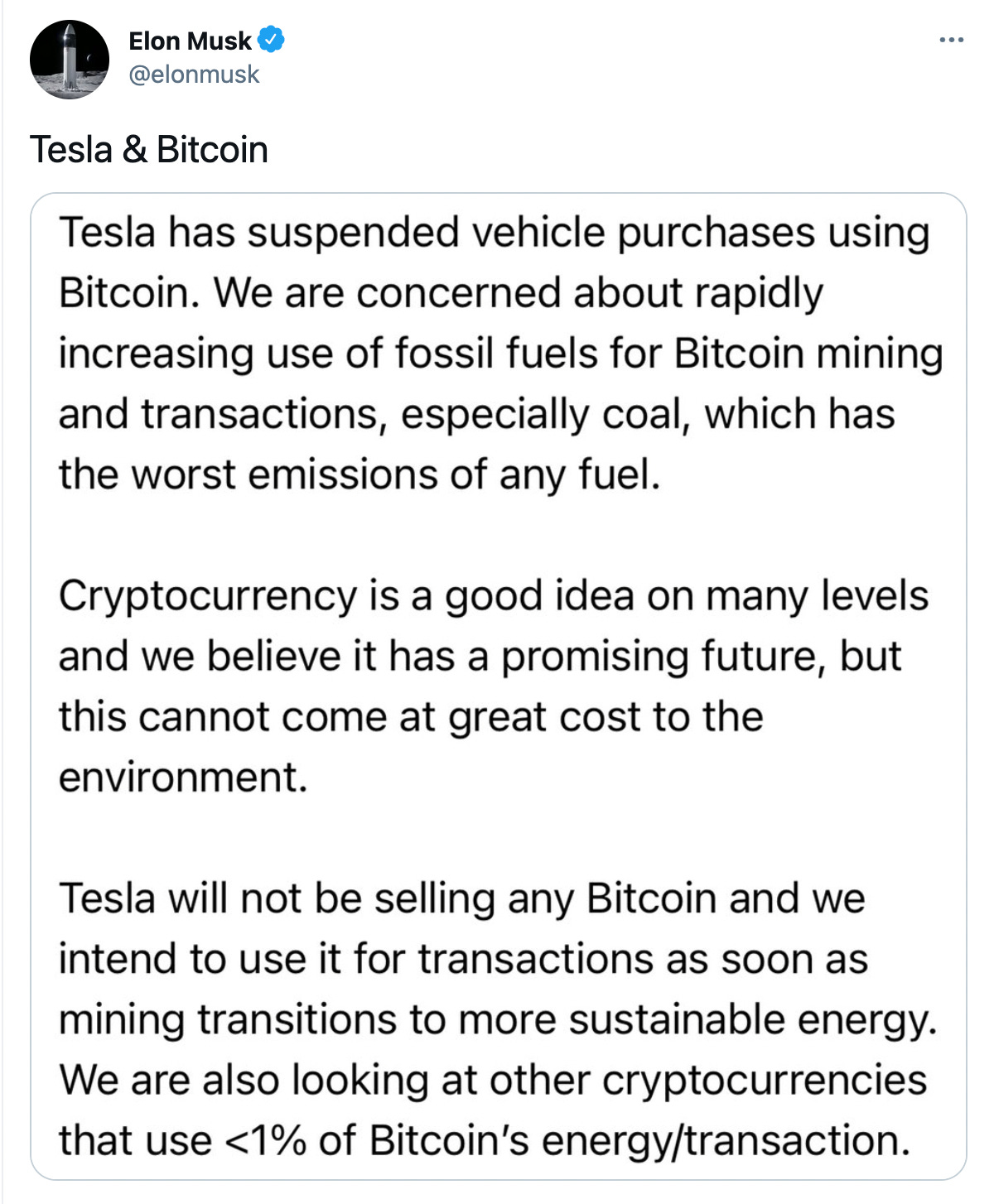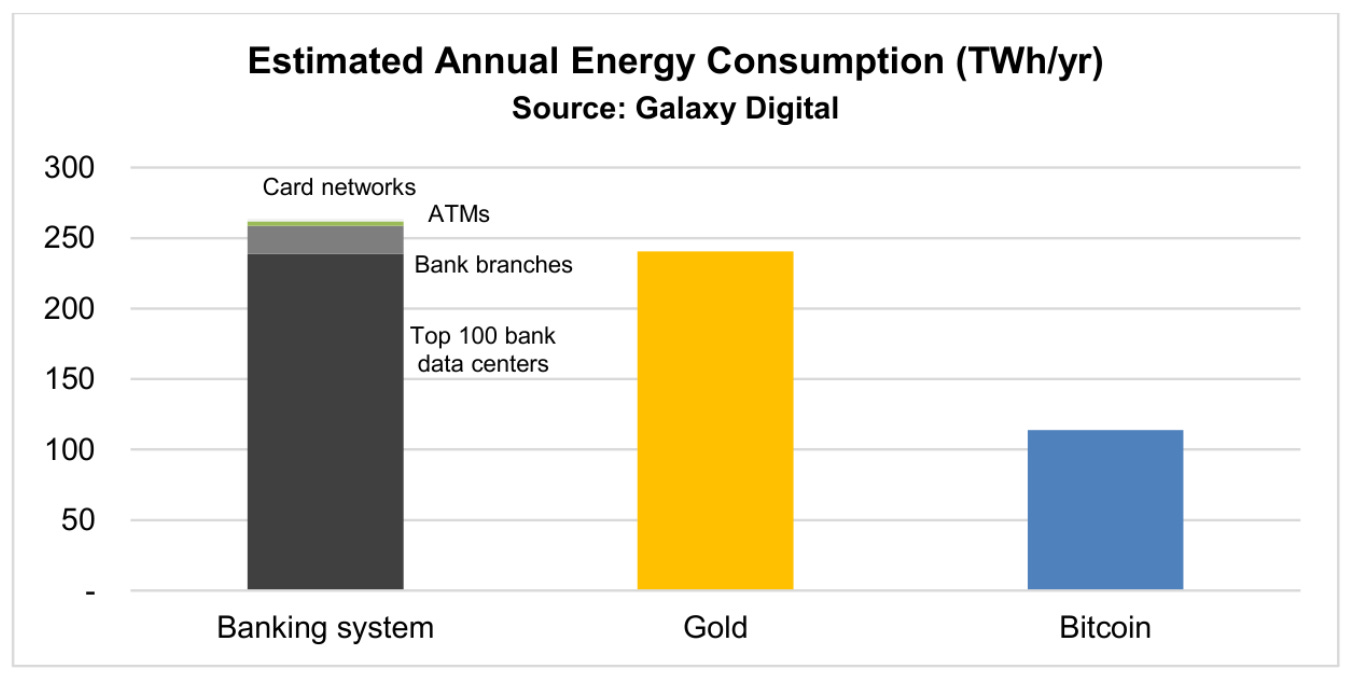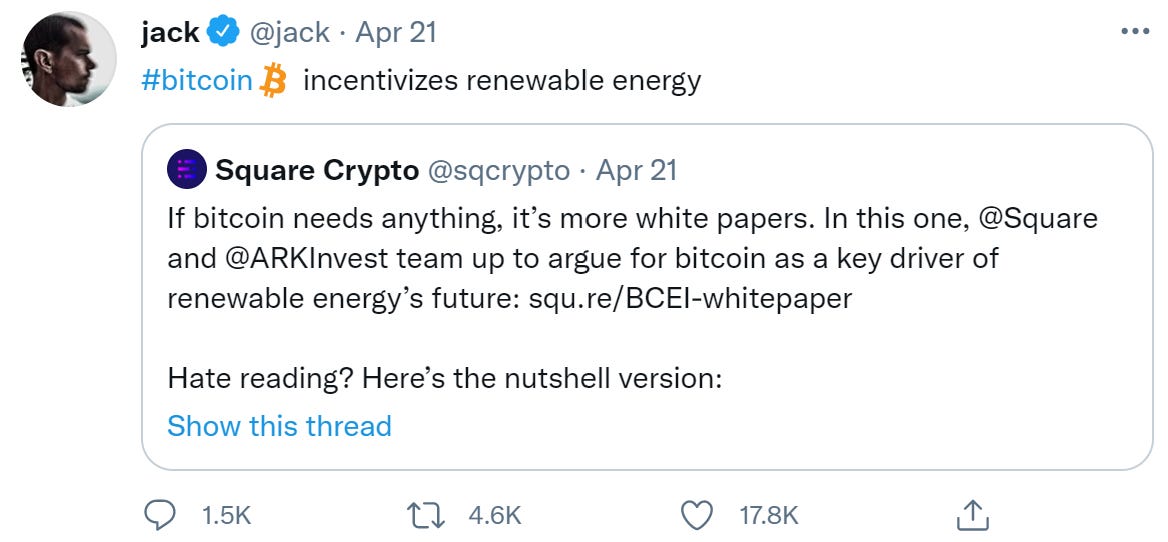In our Friday series, we take a deep dive into different asset investments. The first asset we’re covering - which we will stick with over the next several weeks - is Bitcoin (BTC). Our goal with this weekly series is to familiarize readers with BTC and to address common anti-BTC arguments. For full disclosure, Brandon and Daniel are strong believers in Bitcoin and both have allocated portions of their portfolios to BTC (HODL baby).
Is Bitcoin bad for the environment?
If you’ve been following the Bitcoin world - or the financial word in general - you probably saw the following Tweet from Elon Musk on May 12th:
Elon’s Tweet caused a massive sell off (see the price cliff below) and gave the BTC bears a reason to come out of their caves touting their typical “I told you so”s. BTC fell from $54,605 to $49,595 in the 24 hours following Elon’s tweet.
Before we dive into the energy concerns of BTC, it should first be noted Elon subsequently tweeted that he strongly believes in cryptocurrencies and that Tesla continues to hold BTC on its balance sheet (in fact, according to a recent filing, their CFO now has the title “Master of Coin”). Thus, despite Elon’s initial tweet, it seems as though he remains bullish on BTC. Now, to the point…
Why does BTC require energy (in a nutshell)?
One of BTC’s strengths is its Proof-of-Work framework, where miners race to solve complex hashing problems in order to verify transactions and add new blocks to the blockchain. Although Proof-of-Work provides a high level of security to the BTC protocol, the hashing problems require a large amount of computational power. So long as bitcoins remain more valuable than the cost of energy to mine them, miners will be incentivized to join the network, adding to the energy consumption of the protocol.
What is the energy cost of BTC?
Although Bitcoin mining does consume energy, according to a recent report from Galaxy Digital, the Bitcoin Network consumes less than half the energy of the traditional banking system and half the energy of gold mining. Also, more than 19 times the amount of energy that is used in the Bitcoin Network is lost in transmission of everyday electricity use - according to the data provided by the International Energy Agency (IEA).
Many opponents of Bitcoin assume that the energy used in BTC mining is stolen or is generated using non-renewable resources. However, ARK Investments estimates that 76% of Bitcoin miners actually use renewable forms of energy. Further, many companies provide creative ways to leverage otherwise wasted energy to help power Bitcoin mining “rigs.” Galaxy Digital estimated that oil fields currently generate ~40% of the world’s energy and produce methane gas as a byproduct. Methane gas causes greenhouse effects that are 25 times as environmentally damaging as carbon dioxide. Companies such as Great American Mining, Upstream Data, and Crusoe Energy Systems are building infrastructure to utilize this otherwise-wasted methane gas to mine BTC. These measures have the capacity to reduce methane gas emissions from oil production by ~24x compared to flaring methane into the atmosphere.
Is the energy cost too high?
Many opponents of Bitcoin view it as completely worthless and, in their minds, any amount of energy devoted to a worthless asset is considered wasteful. We are entering this debate with the baseline assumption that BTC is not worthless. In fact, we believe its underlying fundamental features (for example, built-in scarcity and anonymity) make it an incredible store of value and a better, more decentralized monetary system for many countries throughout the world.
If you believe BTC is valuable, the question should not be: is the energy cost too high? Rather, the question should be: how much energy are we willing to spend on this particular financial system? As noted above, our current system uses a massive amount of energy, yet Tesla will surely continue to accept fiat currency for their vehicles. Similar to Tesla’s electric vehicles and Space X’s rockets, the BTC protocol remains far from perfect for the environment. However, all of these innovative technologies (EVs, interplanetary space travel, BTC) represent progress toward a better future. We believe that BTC is worth the current cost and, as is discussed below, will likely end up costing less energy in the future.
So, back to the original question: is BTC bad for the environment? The short answer to this question is: Although far from perfect, the Bitcoin Network is better for the environment than the current financial system AND represents a better financial system.
BTC incentivizes clean energy
Unlike our current financial systems, BTC produces currency via a decentralized, global network of miners who are rewarded for spending computational power. As more transactions occur and more miners join the network, the computational power needed to successfully mine new coinage (in other words, to win the computation race) will increase. The relationship between cost of mining and value of bitcoin is such that miners are incentivized to continue mining if:
The value of bitcoin increases
The cost of mining decreases
Thus, miners in the BTC network are incentivized to reduce the energy cost of producing new coins!
An aside
The massive sell-off following Elon’s tweet may ultimately be beneficial for BTC, as it moved coins out of weak hands and provided lower prices for strong HODLers to accumulate more coinage. At the end of the day, BTC is not Elon and Elon is not BTC. You should invest in BTC because you believe in the potential of the technology, not because one individual is bullish or bearish on a particular day. Also, when you own BTC, volatility is expected and similar spikes/dips in the price occurred during the past two halving periods, but we will get into that next week.
Going forward
As we said in our introduction, we plan to address several arguments against BTC, one at a time, over the next several weeks. We hope that our weekly posts will encourage readers to learn more about this emerging technology.
Common arguments against BTC:
The price is too high (“I’ve missed the boat”)
BTC uses too much energy
BTC is too volatile
BTC is not physically backed by anything
BTC is used primarily by criminals for illegal activity
BTC is not a transactional currency (cannot be used to buy everyday items)
Governments will not allow it or will heavily regulate it
It’s easy to lose access to BTC wallet
Happy Friday everyone - get after it this weekend!
Brandon and Dan
Disclosure: The authors of this writing hold positions in cryptocurrency mentioned in this article. That cryptocurrency is Bitcoin. The article was written by Daniel Kuhman and Brandon Keys, and it expresses the author's own opinions. They are not receiving compensation for it. The information presented in this article is for informational purposes only and in no way should be construed as financial advice or recommendation to buy or sell any stock or cryptocurrency. Brandon and Daniel are not financial advisors. We encourage all readers to do further research and do your own due diligence before making any investments.







